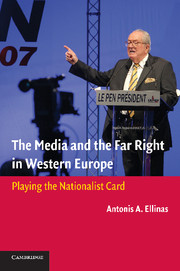Book contents
- Frontmatter
- Contents
- List of Figures
- List of Tables
- Acknowledgments
- Acronyms and Abbreviations
- 1 Introduction
- 2 Explaining Far Right Trajectories
- 3 Party and Media Politics in Austria: The Rise of the FPÖ
- 4 Competing over German Identity: Conservatives and the Nonvisible Far Right
- 5 Greek Nationalists: From Mainstream to the Margins?
- 6 The Growth, Persistence, and Fall of the French National Front
- 7 Conclusion
- Bibliography
- Index
2 - Explaining Far Right Trajectories
Published online by Cambridge University Press: 04 May 2010
- Frontmatter
- Contents
- List of Figures
- List of Tables
- Acknowledgments
- Acronyms and Abbreviations
- 1 Introduction
- 2 Explaining Far Right Trajectories
- 3 Party and Media Politics in Austria: The Rise of the FPÖ
- 4 Competing over German Identity: Conservatives and the Nonvisible Far Right
- 5 Greek Nationalists: From Mainstream to the Margins?
- 6 The Growth, Persistence, and Fall of the French National Front
- 7 Conclusion
- Bibliography
- Index
Summary
This chapter develops a theoretical framework to account for Far Right performance. In line with Chapter 1, the emphasis is on the earlier phase of party development, although as suggested before, the theoretical propositions explicated here also have implications for the subsequent development of the Far Right. The focus is on two major actors: mainstream parties and the mass media. The basic argument presented here is that the fortunes of the Far Right largely depend on mainstream party and mass media behavior: on how mainstream parties compete over national identity issues and on how the media treat the Far Right. Mainstream party competition structures the political opportunities available for the entry of Far Right parties into the electoral market. Access to communication resources allows them to overcome their organizational or financial shortcomings and capitalize on these opportunities. The rest of this chapter develops these basic theoretical propositions in more detail.
National Identity and Public Demand
The concentration on national identity uses and extends the theoretical insights of a significant body of literature on sociocultural change. Earlier contributions to this literature documented a shift in value orientations of Western societies toward postmaterialism. This value change was thought to affect the most affluent members of society and was associated with the rise of Green parties in Western Europe (Inglehart 1971, 1977, 1990). More recent contributions have built on these earlier findings to suggest that a parallel process has been taking place on the opposite side of the political spectrum.
- Type
- Chapter
- Information
- The Media and the Far Right in Western EuropePlaying the Nationalist Card, pp. 21 - 40Publisher: Cambridge University PressPrint publication year: 2010



